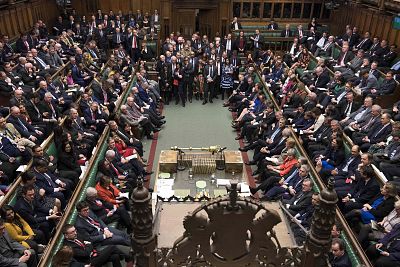With just over two weeks to a March 29 deadline and still no deal, Parliament is expected to reject leaving the E.U. without a deal.
LONDON — With just 16 days to go before Britain is set to leave the European Union, lawmakers will vote Wednesday on whether to leave without a deal — a scenario that many business leaders and experts expect would damage the country's economy.
The new vote comes a day after Parliament overwhelmingly rejected the withdrawal agreement that Prime Minister Theresa May painstakingly negotiated with the E.U. over the course of nearly two years.
It is widely expected that lawmakers will say no to leaving the E.U. without a deal. But that is exactly what will happen on March 29, unless they take action.
Leaving without a deal would put up trade barriers between Britain and its closest neighbors. Supermarkets have warned of shortages of fresh produce, businesses have been stockpiling goods for months and the government has built up stocks of medicines.
Businesses in particular are pushing for lawmakers to ensure that the U.K. leaves with an agreement in place.
"The sledgehammer that is hanging over business has become unmanageable," said Carolyn Fairbairn, the director general of the Confederation of British Industry, a trade group.
The government has said that a no-deal scenario would leave the economy 6 percent to 9 percent smaller over 15 years than remaining in the E.U.
No-deal Brexit's supporters argue that crashing out would free the U.K. from E.U. rules and red tape, and allow Britain to forge an independent global trade policy.
Wednesday's vote will have no legal force, but will serve to direct May's next steps. If a no-deal Brexit is rejected then lawmakers will vote on whether to ask the E.U. for a delay to the move — something to which all the bloc's other 27 members must agree.
The E.U.'s chief Brexit negotiator Michel Barnier questioned whether there was any point in delaying Britain's departure, saying on Wednesday that the government would need to justify any request.
"Extend this negotiation — what for?" Barnier asked in a speech to the European Parliament in Strasbourg. "It's over."
Whatever happened, he said, the withdrawal treaty agreed with May would remain the only deal on offer."If the U.K. still wants to leave the E.U. in an orderly manner, this treaty is — and will remain — the only treaty possible," he said.
For many lawmakers, the main sticking point is an insurance policy designed to keep open the border between Northern Ireland, which is part of the U.K., and the Republic of Ireland, which will remain part of the E.U.
May worked closely with the E.U. after the first failed vote to clarify the so-called Irish backstop. Brexit supporters fear that the backstop could be used to bind the country to E.U. regulations indefinitely.
On Monday, May made a last-minute visit to Strasbourg, France, for talks with European leaders. She had hoped that what she called "legal changes" they made to the backstop would be enough to convince reluctant U.K. lawmakers to vote for her deal.
In the end, Brexit supporters weren't satisfied.
What happens next is anyone's guess. May could try and put her agreement up for a third vote in Parliament, though even if it does pass an extension will likely be needed to settle the details.
Some lawmakers want Parliament consider different forms of Brexit to see if there is a majority for a closer relationship with Europe than May envisions.
British lawmakers who support Brexit, meanwhile, raised the alarm over the possibility the country would never actually exit the European bloc.
"No deal is going to be very disruptive for the economy," Britain's Brexit minister Stephen Barclay Barclay told BBC radio. "But I think no Brexit is catastrophic for our democracy. Between those very unpleasant choices, I think no Brexit is the bigger risk."












